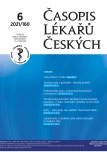-
Medical journals
- Career
Iodine intake monitoring in neonatal population in the Czech Republic: alarming numbers in 2020
Authors: Martin Světnička 1,2; Monika Hedelová 3; Hana Vinohradská 4; Eva El-Lababidi 1,2
Authors‘ workplace: Klinika dětí a dorostu 3. LF UK a FN Královské Vinohrady, Praha 1; Centrum pro výzkum výživy, metabolismu a diabetu 3. LF UK v Praze 2; Laboratoř novorozeneckého screeningu, Klinika dětí a dorostu 3. LF UK a FN Královské Vinohrady, Praha 3; Laboratoř novorozeneckého screeningu, Oddělení dětské hematologie a biochemie FN Brno 4
Published in: Čas. Lék. čes. 2021; 160: 233-236
Category: Review Article
Overview
Thanks to comprehensive and long-term preventive programs, the Czech Republic has taken its place among the countries with a resolved iodine deficiency at all population levels since 2004. A sensitive indicator of iodine supply to the population, which can also be used to monitor the efficiency of prophylactic programs, is the TSH assessment in the nationwide neonatal screening of congenital hypothyroidism. Nevertheless, recent results of neonatal TSH show that newborns and pregnant women remain very risky groups and their iodine saturation is borderline. In recent years, the percentage of newborns with TSH 5-15 mIU/l has already risen above the 3% mark, i.e. mild iodine deficiency in major part of the Czech Republic (3.8 % in Bohemia, 2.8% in Moravia in 2019 and 4.7 % in Bohemia, 2.9% in Moravia in 2020). For some smaller areas, the values are even higher, which can be related, for example, to the social patterns of the population. The result may be not only the exclusion of the Czech Republic from the list of countries with resolved iodine deficiency, but especially adverse consequences for the cognitive development of the future generation. Therefore, it is essential to intensify nation-wide intervention among both the professional and general public. In this regard, adherence to the supplementation of pregnant and breastfeeding women is crucial with 150-200 μg of iodide in addition to nutritional iodine intake.
Keywords:
neonatal screening – iodine deficiency – neonatal TSH – disorders of mental development – preventive measures – iodine supply in pregnancy
Sources
- WHO. Assessment of iodine deficiency disorders and monitoring their elimination. WHO, 2014.
- Creswell J, Eastman MBZ. Iodine deficiency disorder. JK Pract. 2001; 8 : 190–192.
- Hníková O, Vinohradská H, Dejmek P, Al Taji E. Dlouhodobé zkušenosti z monitorování jodového zásobení novorozenecké populace v České republice. Česko-slovenská pediatrie 2014; 69 : 228–233.
- Jiskra J, Límanová Z. Doporučení pro prevenci, časný záchyt a léčbu tyreopatií v těhotenství 2018. Česká endokrinologická společnost ČLS JEP, 2018.
- Horáček J, Jiskra J, Límanová Z a kol. Doporučení pro diagnostiku a léčbu onemocnění štítné žlázy v těhotenství a pro ženy s poruchou fertility. Vnitřní lékařství 2013; 59 : 909–931.
- HSPH. Fish: Friend or Foe? The Nutrition Source. Harvard T.H. Chan School of Public Health, 2021. Dostupné na: www.hsph.harvard.edu/nutritionsource/fish
- WHO, UNICEF, ICCIDD. Assessment of iodine deficiency disorders and monitoring their elimination. WHO, 2007. Dostupné na: https://apps.who.int/iris/bitstream/handle/10665/43781/9789241595827_eng.pdf
Labels
Addictology Allergology and clinical immunology Angiology Audiology Clinical biochemistry Dermatology & STDs Paediatric gastroenterology Paediatric surgery Paediatric cardiology Paediatric neurology Paediatric ENT Paediatric psychiatry Paediatric rheumatology Diabetology Pharmacy Vascular surgery Pain management Dental Hygienist
Article was published inJournal of Czech Physicians

2021 Issue 6-
All articles in this issue
- ÚVODEM
- Iodine and health in the Czech Republic
- Quarter of a century of work of the Intersectoral Commission on Iodine Deficiency Solution
- Iodine status in premature newborns
- Iodine intake monitoring in neonatal population in the Czech Republic: alarming numbers in 2020
- Problematics of iodine saturation among children on the vegan diet
- Fish – a source of dietary exposure to iodine and other chemicals
- Iodine-containing food supplements available on the Czech market
- Jan Evangelista Purkyně a Napoleon Bonaparte
- Česká farmacie 150 let pod křídly odborné společnosti
- 100 let Sexuologického ústavu Univerzity Karlovy v Praze
- Léčba obezity – přehledně a prakticky
- The importance of iodine nutrition during pregnancy – clinical aspect
- Journal of Czech Physicians
- Journal archive
- Current issue
- Online only
- About the journal
Most read in this issue- Léčba obezity – přehledně a prakticky
- Iodine-containing food supplements available on the Czech market
- Fish – a source of dietary exposure to iodine and other chemicals
- The importance of iodine nutrition during pregnancy – clinical aspect
Login#ADS_BOTTOM_SCRIPTS#Forgotten passwordEnter the email address that you registered with. We will send you instructions on how to set a new password.
- Career

